

Commentary Select
Commentary Select




Leviticus (Preacher's Outline & Sermon Bible Series)
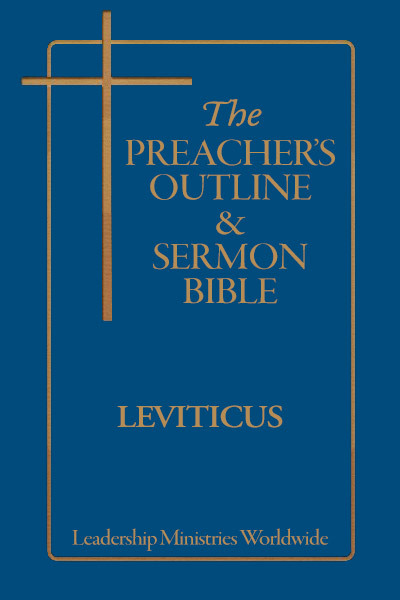
Leviticus (Preacher's Outline & Sermon Bible Series)
The Preacher’s Outline & Sermon Bible® (POSB) is a practical and comprehensive commentary set that gives the pastor or teacher everything they need to preach or teach God’s Word. Covering every book of the Bible, POSB is the perfect resource for expository or topical teaching.
With over a million copies sold in print, POSB is unlike any other commentary you will encounter. Each volume gives you detailed, verse-by-verse exposition for every Bible passage. Along with the biblical commentary, POSB includes extensive outlines with sub-points, thoughts on practical application, deeper studies on key biblical topics and themes, and full cross references.
You will quickly see the added value and ease of use that comes with having this commentary in your Olive Tree library. The Olive Tree edition separates the outlines and commentary to make POSB even easier to use. Instead of scrolling back and forth (or flipping pages), you can see the commentary and outlines side-by-side as you study or prepare your sermon. POSB is also fully functional with the Resource Guide and is configured to help you get to the information you need quickly. You can both drill down to the verse you want to study and easily find all the introductory material on each book of the Bible.
The Preacher’s Outline and Sermon Bible makes it easy to create life-changing sermons and lessons. Everything you need to understand any passage of the Bible is right at your fingertips. And this resource is not just for preachers and teachers; it’s perfect for any Christian who wants to know God’s Word better.
POSB features include:
- Detailed outlines for every book of the Bible
- Well researched and easy to read commentary
- Practical application for godly living
- Deeper studies to dive into key topics and themes
- Full text cross references (no need to look them up)
Leviticus, Numbers, Deuteronomy: Cornerstone Biblical Commentary

Leviticus, Numbers, Deuteronomy: Cornerstone Biblical Commentary
Other features: Provides pastors, teachers, and students with up-to-date evangelical scholarship. Both exegetical and translation commentary. Part of an 18-volume collection. Features New Living Translation Text.
David Baker, Ph.D., University of London, is professor of Old Testament and Semitic languages at Ashland Theological Seminary in Ohio. He serves as editor for the Evangelical Theological Society's Dissertation series and Studies series. He has authored several articles/books, including the NIV Application Commentary on Joel, Obadiah, and Malachi and The Face of Old Testament Studies: A Survey of Contemporary Approaches. Dr. Baker served as a Leviticus reviewer for the New Living Translation.
Dale Brueggemann, Ph.D., Westminster Theological Seminary, pastored in Idaho throughout the 1970s. He has taught at Valley Forge Christian College in Philadelphia, and at Central Bible College in Missouri.
Eugene H. Merrill, Ph.D., Columbia University, is Distinguished Professor of Old Testament Studies at Dallas Theological Seminary in Texas and Distinguished Professor of Old Testament Interpretation at The Southern Baptist Theological Seminary in Kentucky. He is currently director of Eurasia education services for Assemblies of God World Missions, and he has been heavily involved in ministry in Europe, Asia, and the Middle East. He is the author of several articles/books, including a commentary on Deuteronomy in the New American Commentary series and the Deuteronomy study notes for the NLT Study Bible. He also served as a Deuteronomy reviewer for the New Living Translation.
Leviticus: Bible Speaks Today (BST)

Leviticus: Bible Speaks Today (BST)
For most Christians today, there is no message of Leviticus, for Leviticus goes unread. Yet Leviticus was the first priority in Jewish instruction of the law of Moses. Jesus and his hearers knew Leviticus well and took its teachings to heart.
The documentary hypothesis that reigned supreme over Pentateuchal studies for most of the twentieth century undercut the internal coherence of Leviticus that swayed the Jews of the New Testament period, speculating that rather than originating with Moses, Leviticus was the nostalgic revisionist history of Judaic reformers in exile. But more recently, such theories have fallen from favor, and Leviticus is being reconsidered for its historical representation of the ancient and foundational era of the Jews.
Derek Tidball explores the picture in Leviticus of Israel being brought together under the law of Moses. Here is a definitive presentation of what life as the people of God was to be like: the civic, cultic, religious, moral, legal, family and ritual expectations of the covenant community. In accessible prose, Tidball reveals the message brought to the Jews by Leviticus in their day, making room for us to grasp its message to us in our day.
About the Bible Speaks Today (BST) Series:
Edited by J.A. Motyer and the late John R. W. Stott, the Bible Speaks Today commentaries are characterized by what Stott called a "threefold ideal . . . to expound the biblical text with accuracy, to relate it to contemporary life and to be readable." As such, each contributor in this series is both a noted scholar and a working pastor.
The BST series, now complete, covers all sixty-six books of the bible (Old and New Testaments) in fifty-five volumes. If you preach or teach from Scripture, the Bible Speaks Today series will help you apply the timeless biblical message to the everyday experiences of your listeners. And if you study the Bible on your own, these volumes will be a helpful resource focusing on the significance of God's Word for your own life and work.
Life Application Bible Commentary (1 & 2 Corinthians)
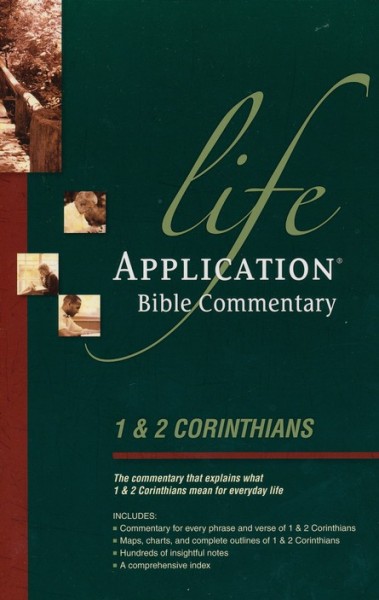
Life Application Bible Commentary (1 & 2 Corinthians)
The Life Application Bible Commentary series is the only commentary to offer sermon and lesson applications alongside stirring commentary. This volume provides in-depth explanation, background, and application for every verse in the books of 1 & 2 Corinthians. Perfect for sermon preparation and lesson planning, this one-of-a-kind reference provides excellent quotes and a bibliography for additional commentary.
Additional features include:
- Charts, diagrams, and maps in the same location as their related verses
- Quotes from various versions, such as the NIV, NRSV, and NLT
- Key information graphically highlighted
Life Application Bible Commentary (1 & 2 Peter, Jude)
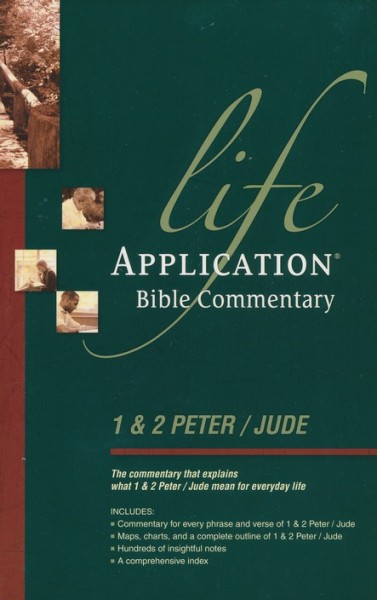
Life Application Bible Commentary (1 & 2 Peter, Jude)
The Life Application Bible Commentary series is the only commentary to offer sermon and lesson applications alongside stirring commentary. Each volume in the series provides in-depth explanation, background, and application for every verse in the text. Perfect for sermon preparation and lesson planning, this one-of-a-kind reference provides excellent quotes and a bibliography for additional commentary.
Additional features include
- Charts, diagrams, and maps in the same location as their related verses
- Quotes from various versions, such as the NIV, NRSV, and NLT
- Key information graphically highlighted
Life Application Bible Commentary (1 & 2 Thessalonians)
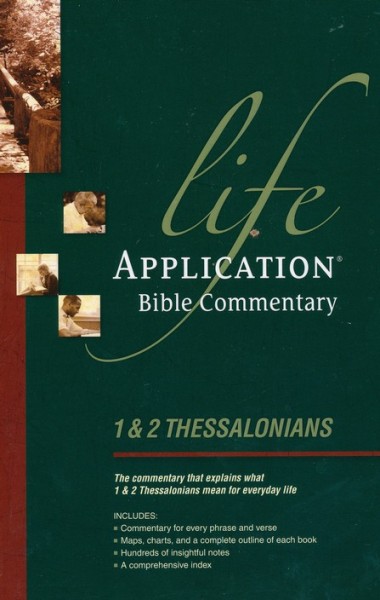
Life Application Bible Commentary (1 & 2 Thessalonians)
The Life Application Bible Commentary series is the only commentary to offer sermon and lesson applications alongside stirring commentary. Each volume in the series provides in-depth explanation, background, and application for every verse in the text. Perfect for sermon preparation and lesson planning, this one-of-a-kind reference provides excellent quotes and a bibliography for additional commentary.
Additional features include
- Charts, diagrams, and maps in the same location as their related verses
- Quotes from various versions, such as the NIV, NRSV, and NLT
- Key information graphically highlighted
Life Application Bible Commentary (1 & 2 Timothy & Titus)

Life Application Bible Commentary (1 & 2 Timothy & Titus)
The Life Application Bible Commentary series is the only commentary to offer sermon and lesson applications alongside stirring commentary. Each volume in the series provides in-depth explanation, background, and application for every verse in the text. Perfect for sermon preparation and lesson planning, this one-of-a-kind reference provides excellent quotes and a bibliography for additional commentary.
Additional features include
- Charts, diagrams, and maps in the same location as their related verses
- Quotes from various versions, such as the NIV, NRSV, and NLT
- Key information graphically highlighted
Life Application Bible Commentary (1, 2, & 3 John)

Life Application Bible Commentary (1, 2, & 3 John)
The Life Application Bible Commentary series is the only commentary to offer sermon and lesson applications alongside stirring commentary. Each volume in the series provides in-depth explanation, background, and application for every verse in the text. Perfect for sermon preparation and lesson planning, this one-of-a-kind reference provides excellent quotes and a bibliography for additional commentary.
Additional features include
- Charts, diagrams, and maps in the same location as their related verses
- Quotes from various versions, such as the NIV, NRSV, and NLT
- Key information graphically highlighted
Life Application Bible Commentary (Acts)

Life Application Bible Commentary (Acts)
The Life Application Bible Commentary series is the only commentary to offer sermon and lesson applications alongside stirring commentary. Each volume in the series provides in-depth explanation, background, and application for every verse in the text. Perfect for sermon preparation and lesson planning, this one-of-a-kind reference provides excellent quotes and a bibliography for additional commentary.
Additional features include
- Charts, diagrams, and maps in the same location as their related verses
- Quotes from various versions, such as the NIV, NRSV, and NLT
- Key information graphically highlighted
Life Application Bible Commentary (Ephesians)
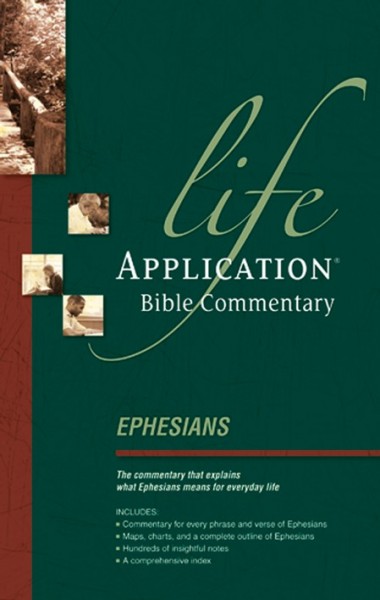
Life Application Bible Commentary (Ephesians)
The Life Application Bible Commentary series is the only commentary to offer sermon and lesson applications alongside stirring commentary. Each volume in the series provides in-depth explanation, background, and application for every verse in the text. Perfect for sermon preparation and lesson planning, this one-of-a-kind reference provides excellent quotes and a bibliography for additional commentary.
Additional features include
- Charts, diagrams, and maps in the same location as their related verses
- Quotes from various versions, such as the NIV, NRSV, and NLT
- Key information graphically highlighted
Life Application Bible Commentary (Galatians)
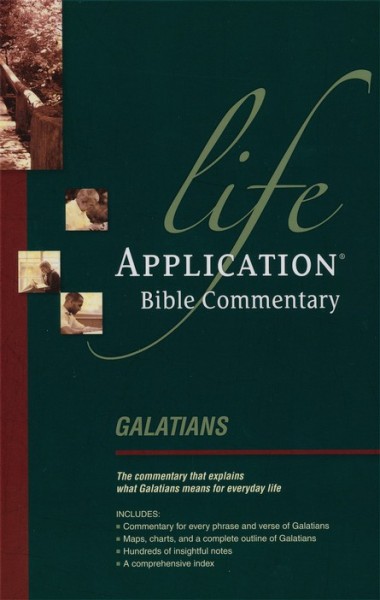
Life Application Bible Commentary (Galatians)
The Life Application Bible Commentary series is the only commentary to offer sermon and lesson applications alongside stirring commentary. Each volume in the series provides in-depth explanation, background, and application for every verse in the text. Perfect for sermon preparation and lesson planning, this one-of-a-kind reference provides excellent quotes and a bibliography for additional commentary.
Additional features include
- Charts, diagrams, and maps in the same location as their related verses
- Quotes from various versions, such as the NIV, NRSV, and NLT
- Key information graphically highlighted
Life Application Bible Commentary (Hebrews)
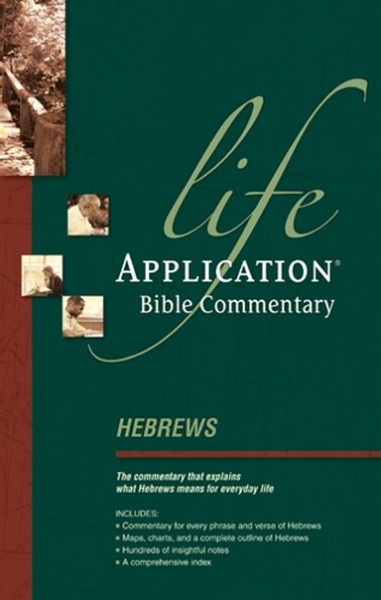
Life Application Bible Commentary (Hebrews)
The Life Application Bible Commentary series is the only commentary to offer sermon and lesson applications alongside stirring commentary. Each volume in the series provides in-depth explanation, background, and application for every verse in the text. Perfect for sermon preparation and lesson planning, this one-of-a-kind reference provides excellent quotes and a bibliography for additional commentary.
Additional features include
- Charts, diagrams, and maps in the same location as their related verses
- Quotes from various versions, such as the NIV, NRSV, and NLT
- Key information graphically highlighted
Life Application Bible Commentary (James)
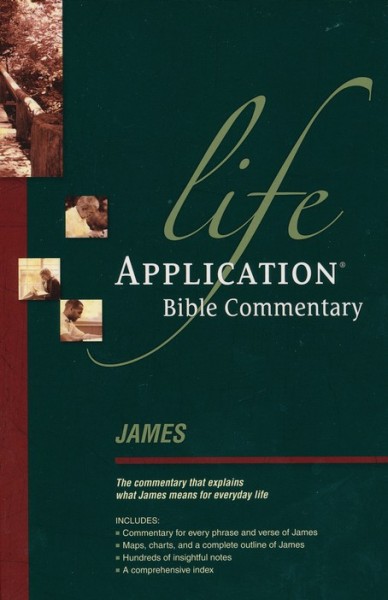
Life Application Bible Commentary (James)
The Life Application Bible Commentary series is the only commentary to offer sermon and lesson applications alongside stirring commentary. Each volume in the series provides in-depth explanation, background, and application for every verse in the text. Perfect for sermon preparation and lesson planning, this one-of-a-kind reference provides excellent quotes and a bibliography for additional commentary.
Additional features include
- Charts, diagrams, and maps in the same location as their related verses
- Quotes from various versions, such as the NIV, NRSV, and NLT
- Key information graphically highlighted
Life Application Bible Commentary (John)

Life Application Bible Commentary (John)
The Life Application Bible Commentary series is the only commentary to offer sermon and lesson applications alongside stirring commentary. Each volume in the series provides in-depth explanation, background, and application for every verse in the text. Perfect for sermon preparation and lesson planning, this one-of-a-kind reference provides excellent quotes and a bibliography for additional commentary.
Additional features include
- Charts, diagrams, and maps in the same location as their related verses
- Quotes from various versions, such as the NIV, NRSV, and NLT
- Key information graphically highlighted
Life Application Bible Commentary (Luke)
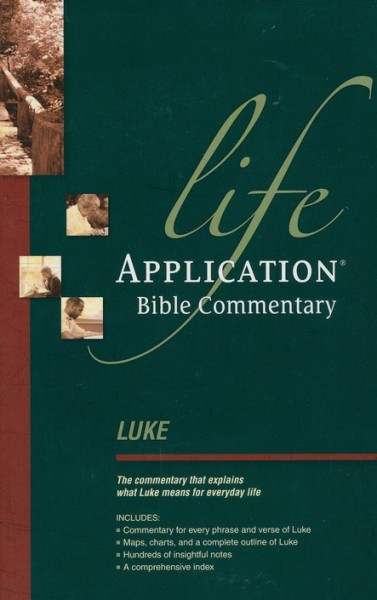
Life Application Bible Commentary (Luke)
The Life Application Bible Commentary series is the only commentary to offer sermon and lesson applications alongside stirring commentary. Each volume in the series provides in-depth explanation, background, and application for every verse in the text. Perfect for sermon preparation and lesson planning, this one-of-a-kind reference provides excellent quotes and a bibliography for additional commentary.
Additional features include
- Charts, diagrams, and maps in the same location as their related verses
- Quotes from various versions, such as the NIV, NRSV, and NLT
- Key information graphically highlighted
Life Application Bible Commentary (Mark)
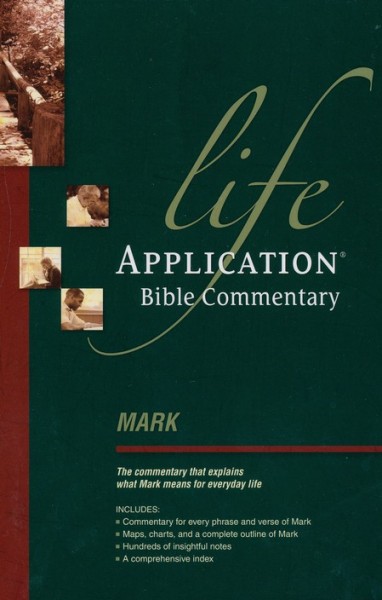
Life Application Bible Commentary (Mark)
The Life Application Bible Commentary series is the only commentary to offer sermon and lesson applications alongside stirring commentary. Each volume in the series provides in-depth explanation, background, and application for every verse in the text. Perfect for sermon preparation and lesson planning, this one-of-a-kind reference provides excellent quotes and a bibliography for additional commentary.
Additional features include
- Charts, diagrams, and maps in the same location as their related verses
- Quotes from various versions, such as the NIV, NRSV, and NLT
- Key information graphically highlighted
Life Application Bible Commentary (Matthew)
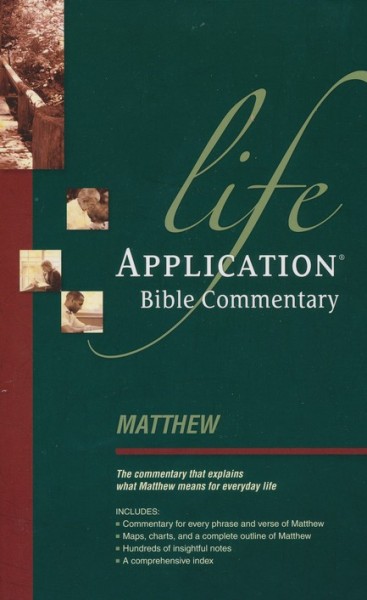
Life Application Bible Commentary (Matthew)
The Life Application Bible Commentary series is the only commentary to offer sermon and lesson applications alongside stirring commentary. Each volume in the series provides in-depth explanation, background, and application for every verse in the text. Perfect for sermon preparation and lesson planning, this one-of-a-kind reference provides excellent quotes and a bibliography for additional commentary.
Additional features include
- Charts, diagrams, and maps in the same location as their related verses
- Quotes from various versions, such as the NIV, NRSV, and NLT
- Key information graphically highlighted
Life Application Bible Commentary (Philippians, Colossians, & Philemon)
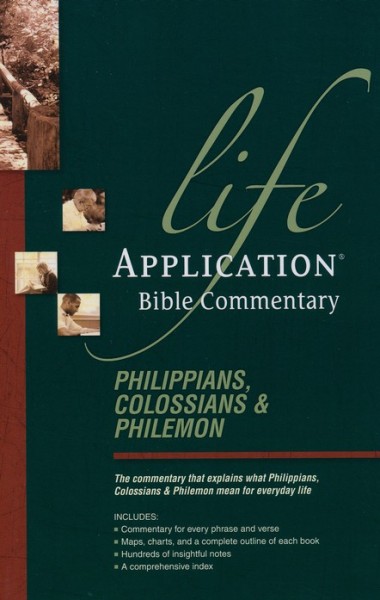
Life Application Bible Commentary (Philippians, Colossians, & Philemon)
The Life Application Bible Commentary series is the only commentary to offer sermon and lesson applications alongside stirring commentary. Each volume in the series provides in-depth explanation, background, and application for every verse in the text. Perfect for sermon preparation and lesson planning, this one-of-a-kind reference provides excellent quotes and a bibliography for additional commentary.
Additional features include
- Charts, diagrams, and maps in the same location as their related verses
- Quotes from various versions, such as the NIV, NRSV, and NLT
- Key information graphically highlighted
Life Application Bible Commentary (Revelation)
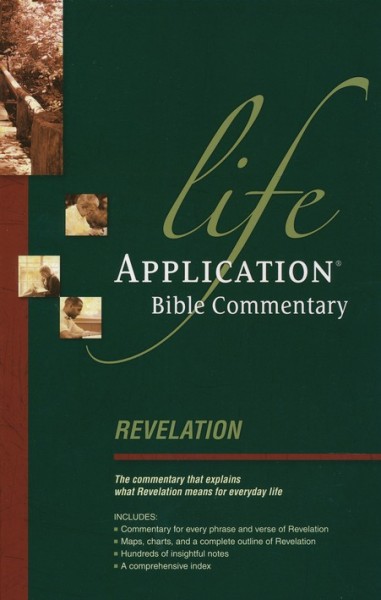
Life Application Bible Commentary (Revelation)
The Life Application Bible Commentary series is the only commentary to offer sermon and lesson applications alongside stirring commentary. Each volume in the series provides in-depth explanation, background, and application for every verse in the text. Perfect for sermon preparation and lesson planning, this one-of-a-kind reference provides excellent quotes and a bibliography for additional commentary.
Additional features include
- Charts, diagrams, and maps in the same location as their related verses
- Quotes from various versions, such as the NIV, NRSV, and NLT
- Key information graphically highlighted
Life Application Bible Commentary (Romans)
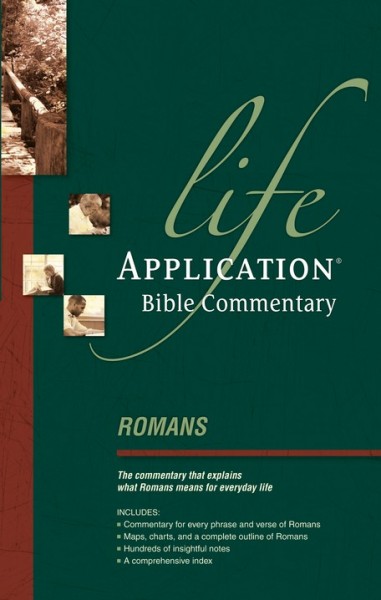
Life Application Bible Commentary (Romans)
The Life Application Bible Commentary series is the only commentary to offer sermon and lesson applications alongside stirring commentary. Each volume in the series provides in-depth explanation, background, and application for every verse in the text. Perfect for sermon preparation and lesson planning, this one-of-a-kind reference provides excellent quotes and a bibliography for additional commentary.
Additional features include
- Charts, diagrams, and maps in the same location as their related verses
- Quotes from various versions, such as the NIV, NRSV, and NLT
- Key information graphically highlighted
Luke (Preacher's Outline & Sermon Bible Series)
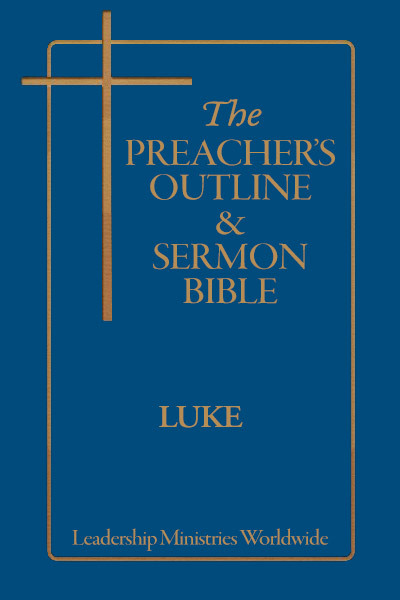
Luke (Preacher's Outline & Sermon Bible Series)
The Preacher’s Outline & Sermon Bible® (POSB) is a practical and comprehensive commentary set that gives the pastor or teacher everything they need to preach or teach God’s Word. Covering every book of the Bible, POSB is the perfect resource for expository or topical teaching.
With over a million copies sold in print, POSB is unlike any other commentary you will encounter. Each volume gives you detailed, verse-by-verse exposition for every Bible passage. Along with the biblical commentary, POSB includes extensive outlines with sub-points, thoughts on practical application, deeper studies on key biblical topics and themes, and full cross references.
You will quickly see the added value and ease of use that comes with having this commentary in your Olive Tree library. The Olive Tree edition separates the outlines and commentary to make POSB even easier to use. Instead of scrolling back and forth (or flipping pages), you can see the commentary and outlines side-by-side as you study or prepare your sermon. POSB is also fully functional with the Resource Guide and is configured to help you get to the information you need quickly. You can both drill down to the verse you want to study and easily find all the introductory material on each book of the Bible.
The Preacher’s Outline and Sermon Bible makes it easy to create life-changing sermons and lessons. Everything you need to understand any passage of the Bible is right at your fingertips. And this resource is not just for preachers and teachers; it’s perfect for any Christian who wants to know God’s Word better.
POSB features include:
- Detailed outlines for every book of the Bible
- Well researched and easy to read commentary
- Practical application for godly living
- Deeper studies to dive into key topics and themes
- Full text cross references (no need to look them up)
Luke, Acts: Cornerstone Biblical Commentary
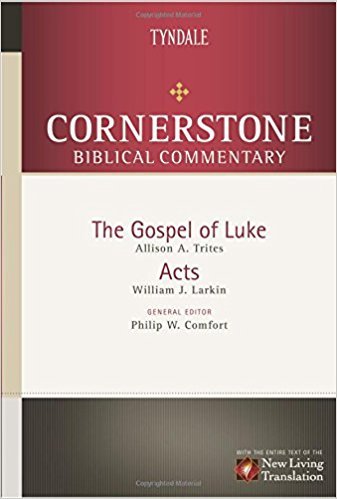
Luke, Acts: Cornerstone Biblical Commentary
Rev. Dr. Allison Trites served as professor of Greek and New Testament at the Aacadia Divinity College in Wolfville, Nova Scotia, for 37 years. He has also provided leadership beyond the walls of the college, having served as president of the United Baptist Convention of the Atlantic Provinces, chair of the Deacon's Board of the Wolfville Baptist Church, Baptist representative on the Canadian Council for Theological Education, as well as countless other volunteer positions.
Dr. William J. Larkin is an ordained minister in the Presbyterian Church in America and has an active ministry in adult Christian education, particularly Bible teaching. He holds a B.A., 1967, Wheaton College; B.D., 1970, Princeton Theological Seminary; Ph.1975, University of Durham, England, and has served in various pastorates as well as being on faculty at Columbia Biblical Seminary and School of Missions since 1975. He also served on the Bible Translation Committee for the NLT.
Luke: Ancient Christian Commentary on Scripture (ACCS)
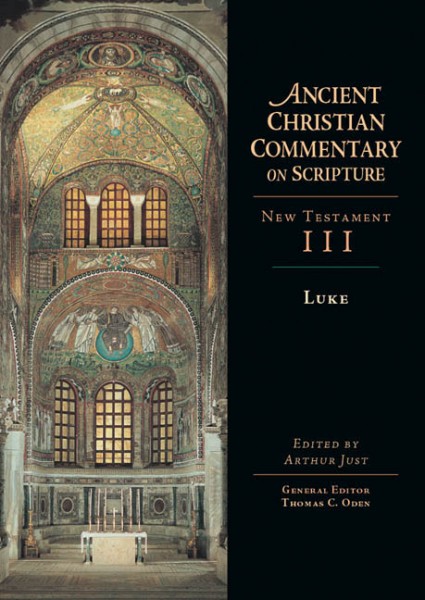
Luke: Ancient Christian Commentary on Scripture (ACCS)
The Ancient Christian Commentary on Scripture does what very few of today's students of the Bible could do for themselves. With the aid of computer technology, the vast array of writings from the church fathers—including much that is available only in the ancient languages—have been combed for their comment on Scripture. From these results, scholars with a deep knowledge of the fathers and a heart for the church have hand-selected material for each volume, shaping, annotating and introducing it to today's readers. Each portion of commentary has been chosen for its salient insight, its rhetorical power and its faithful representation of the consensual exegesis of the early church.
The Ancient Christian Commentary on Scripture is an ecumenical project, promoting a vital link of communication between the varied Christian traditions of today and their common ancient ancestors in the faith. On this shared ground, we listen as leading pastoral theologians of seven centuries gather around the text of Scripture and offer their best theological, spiritual and pastoral insights.
Today the historical-critical method of interpretation has nearly exhausted its claim on the biblical text and on the church. In its wake there is a widespread yearning among Christian individuals and communities for the wholesome, the deep and the enduring. The Ancient Christian Commentary on Scripture does not seek to replace those excellent commentaries that have been produced in the twentieth century. Rather, it supplements them, framing them with interpretive voices that have long sustained the church and only recently have fallen silent. It invites us to listen with appreciative ears and sympathetic minds as our ancient ancestors in the faith describe and interpret the scriptural vistas as they see them.
The Ancient Christian Commentary on Scripture is a postcritical revival of the early commentary tradition known as the glossa ordinaria, a text artfully elaborated with ancient and authoritative reflections and insights. An uncommon companion for theological interpretation, spiritual reading, and wholesome teaching and preaching.
About the Luke volume:
For the church fathers the Gospels did not serve as resources for individual analysis and academic study. They were read and heard and interpreted within the worshiping community. They served as sources for pastoral counsel and admonition for those who were committed to the Way. Although Matthew and John were generally the preferred Gospels, Luke, because of his particular interests and unique contributions, took pride of place during the Christmas season as well as during Easter and other major feasts.
During the early patristic period, the tradition of continuous reading (lectio continua) through the Gospels developed, such that over a course of time a complete Gospel was read in sections, and sermons were preached on the readings either at weekly or midweek worship and Communion liturgies or during morning and evening prayer services. Among such sermons that have survived, this commentary includes selections from Origen and Cyril of Alexandria.
Aside from sermons, we find that the fathers addressed exegetical issues in theological treatises, pastoral letters and catechetical lectures. Among these, as in other ACCS volumes, readers will find materials ranging from East to West and from the first to the eighth centuries. Among well-known fathers cited are Ambrose, Athanasius, Augustine, the Cappadocians, John Chrysostom, John of Damascus and Bede the Venerable. Among lesser-known fathers are John Cassian, Philoxenus of Mabbug and Theophylact.
This volume, edited by Arthur A. Just, opens up a treasure house of ancient wisdom that allows these faithful witnesses, some appearing here in English translation for the first time, to speak with eloquence and intellectual acumen to the church today.
Luke: Bible Speaks Today (BST)
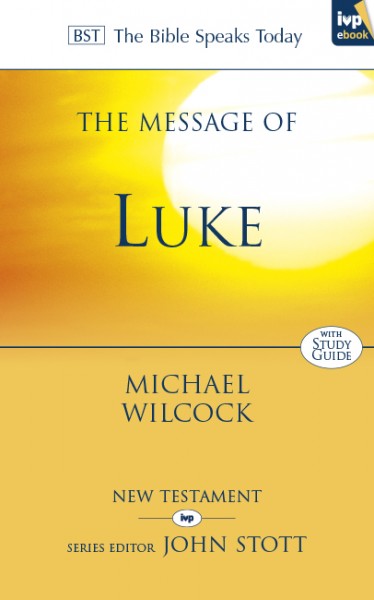
Luke: Bible Speaks Today (BST)
Luke the Physician was fascinated by people - rich and poor, Jews and Gentiles, men and women, rulers and slaves. In his Gospel he delights to portray Jesus as the Saviour not of an elite group but of any one, in any condition, who turns to him. Jesus is indeed the Saviour of the world.
Luke knew exactly what he was doing when he wrote his Gospel. He tells us his goal in the opening verses: to set forth an orderly and accurate account of what had been accomplished by the life and teaching of Jesus Christ. In The Message of Luke, Michael Wilcock gives special attention to these opening words. Then, as he examines the individual deeds and sayings of Jesus, he shows how the structure of Luke's narrative brings out their meaning.
The good news of Luke is still true today. None of us are beyond redemption unless we choose to put ourselves there. This message has implications not only for our personal lives but for our churches and society as a whole.
About the Bible Speaks Today (BST) Series:
Edited by J.A. Motyer and the late John R. W. Stott, the Bible Speaks Today commentaries are characterized by what Stott called a "threefold ideal . . . to expound the biblical text with accuracy, to relate it to contemporary life and to be readable." As such, each contributor in this series is both a noted scholar and a working pastor.
The BST series, now complete, covers all sixty-six books of the bible (Old and New Testaments) in fifty-five volumes. If you preach or teach from Scripture, the Bible Speaks Today series will help you apply the timeless biblical message to the everyday experiences of your listeners. And if you study the Bible on your own, these volumes will be a helpful resource focusing on the significance of God's Word for your own life and work.
Luke: New International Greek Testament Commentary Series (NIGTC)
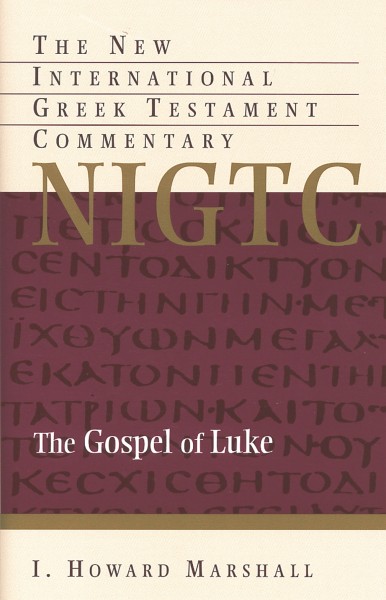
Luke: New International Greek Testament Commentary Series (NIGTC)
Written by I. Howard Marshall, acclaimed professor and Bible scholar and the series editor for the New International Greek Testament Commentary, this volume on the Gospel of Luke provides the tools necessary for Bible scholars at any level to study and dig deeply into the Luke's valuable Gospel. Leaning heavily on the Greek text for semantic and hermeneutic criticism, Marshall unwinds the complexity of Luke's writing so that clear and appropriate theological and exegetical research may be gleaned out of the physician's letter.
Malachi: Bible Speaks Today (BST)
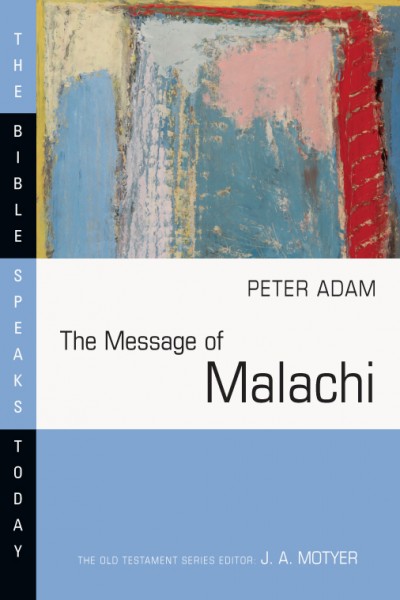
Malachi: Bible Speaks Today (BST)
The book of Malachi fittingly sits in Christian Bibles as the last book of the Old Testament, which it assumes, summarizes and applies. Yet it also looks forward to the New Testament with its promises of the coming reign of God.
A striking feature of the book is the way in which every word of God is contradicted or questioned by his people. God's persistence in speaking to them is a clear picture of sin and grace in close proximity. Furthermore, God's people neither served him wholeheartedly nor turned entirely away in blatant disobedience. This was not neutral territory but a dangerous whirlpool of self-deception.
Peter Adam's thorough exposition shows how Malachi is God's effective remedy for such a situation. The greatest sin of God's people is the sin against God—the source of all sin against ourselves and others. At the heart of God's people, the church, must lie a deep, overwhelming conviction that God loves them—just as he reminds Israel in his first words to them in this book.
About the Bible Speaks Today (BST) Series:
Edited by J.A. Motyer and the late John R. W. Stott, the Bible Speaks Today commentaries are characterized by what Stott called a "threefold ideal . . . to expound the biblical text with accuracy, to relate it to contemporary life and to be readable." As such, each contributor in this series is both a noted scholar and a working pastor.
The BST series, now complete, covers all sixty-six books of the bible (Old and New Testaments) in fifty-five volumes. If you preach or teach from Scripture, the Bible Speaks Today series will help you apply the timeless biblical message to the everyday experiences of your listeners. And if you study the Bible on your own, these volumes will be a helpful resource focusing on the significance of God's Word for your own life and work.
Mark (Preacher's Outline & Sermon Bible Series)

Mark (Preacher's Outline & Sermon Bible Series)
The Preacher’s Outline & Sermon Bible® (POSB) is a practical and comprehensive commentary set that gives the pastor or teacher everything they need to preach or teach God’s Word. Covering every book of the Bible, POSB is the perfect resource for expository or topical teaching.
With over a million copies sold in print, POSB is unlike any other commentary you will encounter. Each volume gives you detailed, verse-by-verse exposition for every Bible passage. Along with the biblical commentary, POSB includes extensive outlines with sub-points, thoughts on practical application, deeper studies on key biblical topics and themes, and full cross references.
You will quickly see the added value and ease of use that comes with having this commentary in your Olive Tree library. The Olive Tree edition separates the outlines and commentary to make POSB even easier to use. Instead of scrolling back and forth (or flipping pages), you can see the commentary and outlines side-by-side as you study or prepare your sermon. POSB is also fully functional with the Resource Guide and is configured to help you get to the information you need quickly. You can both drill down to the verse you want to study and easily find all the introductory material on each book of the Bible.
The Preacher’s Outline and Sermon Bible makes it easy to create life-changing sermons and lessons. Everything you need to understand any passage of the Bible is right at your fingertips. And this resource is not just for preachers and teachers; it’s perfect for any Christian who wants to know God’s Word better.
POSB features include:
- Detailed outlines for every book of the Bible
- Well researched and easy to read commentary
- Practical application for godly living
- Deeper studies to dive into key topics and themes
- Full text cross references (no need to look them up)
Mark: Ancient Christian Commentary on Scripture (ACCS)

Mark: Ancient Christian Commentary on Scripture (ACCS)
The Ancient Christian Commentary on Scripture does what very few of today's students of the Bible could do for themselves. With the aid of computer technology, the vast array of writings from the church fathers—including much that is available only in the ancient languages—have been combed for their comment on Scripture. From these results, scholars with a deep knowledge of the fathers and a heart for the church have hand-selected material for each volume, shaping, annotating and introducing it to today's readers. Each portion of commentary has been chosen for its salient insight, its rhetorical power and its faithful representation of the consensual exegesis of the early church.
The Ancient Christian Commentary on Scripture is an ecumenical project, promoting a vital link of communication between the varied Christian traditions of today and their common ancient ancestors in the faith. On this shared ground, we listen as leading pastoral theologians of seven centuries gather around the text of Scripture and offer their best theological, spiritual and pastoral insights.
Today the historical-critical method of interpretation has nearly exhausted its claim on the biblical text and on the church. In its wake there is a widespread yearning among Christian individuals and communities for the wholesome, the deep and the enduring. The Ancient Christian Commentary on Scripture does not seek to replace those excellent commentaries that have been produced in the twentieth century. Rather, it supplements them, framing them with interpretive voices that have long sustained the church and only recently have fallen silent. It invites us to listen with appreciative ears and sympathetic minds as our ancient ancestors in the faith describe and interpret the scriptural vistas as they see them.
The Ancient Christian Commentary on Scripture is a postcritical revival of the early commentary tradition known as the glossa ordinaria, a text artfully elaborated with ancient and authoritative reflections and insights. An uncommon companion for theological interpretation, spiritual reading, and wholesome teaching and preaching.
About the Mark volume:
The 1999 Christianity Today Book Award Winner
The early church valued the Gospel of Mark for its preservation of the apostolic voice and gospel narrative of Peter. Yet the early church fathers very rarely produced sustained commentary on Mark. This brisk-paced and robust little Gospel, so much enjoyed by modern readers, was overshadowed in the minds of the fathers by the magisterial Gospels of Matthew and John.
But now with the assistance of computer searches, an abundance of comment has been discovered to be embedded and interleaved amidst the textual archives of patristic homilies, apologies, letters, commentaries, theological treatises and hymnic verses.
In this Ancient Christian Commentary on Mark, the insights of Augustine of Hippo and Clement of Alexandria, Ephrem the Syrian and Cyril of Jerusalem join in a polyphony of interpretive voices of the Eastern and Western church from the second century to the seventh. St. Mark's Gospel displays the evocative power of its story, parables and passion as it ignites a brilliant exhibit of theological insight and pastoral wisdom.
The Ancient Christian Commentary on Mark (now in its second edition) opens up a long-forgotten passage through the arid and precipitous slopes of post-Enlightenment critical interpretation and bears us along to a fertile valley basking in the sunshine of theological and spiritual interpretation. In these pages we enter the interpretive world that long nurtured the great premodern pastors, theologians and saints of the church.
Mark: Bible Speaks Today (BST)
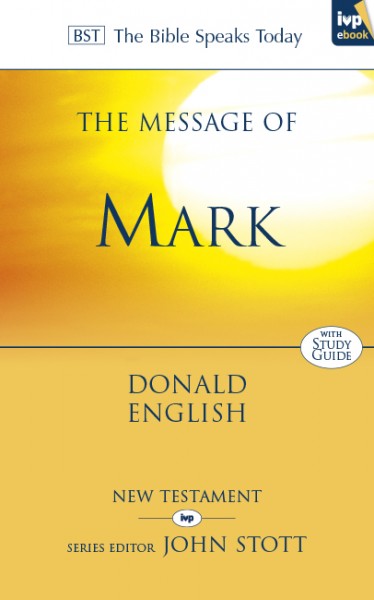
Mark: Bible Speaks Today (BST)
At first sight the Gospel of Mark is a simple account of the ministry of Jesus with lots of stories, plenty of action, a large amount of human interest, and some very straight and searching questions, mostly from Jesus himself.
Yet underlying the Gospel is the cross and the cost of discipleship, focusing the question of who Jesus was, and how people should respond to him. Donald English's The Message of Mark picks up Mark's focus on faith as a risky, total commitment to Christ, and on its mysteries - pre-eminently, why some people believe, and others do not, even to the point of opposition.
About the Bible Speaks Today (BST) Series:
Edited by J.A. Motyer and the late John R. W. Stott, the Bible Speaks Today commentaries are characterized by what Stott called a "threefold ideal . . . to expound the biblical text with accuracy, to relate it to contemporary life and to be readable." As such, each contributor in this series is both a noted scholar and a working pastor.
The BST series, now complete, covers all sixty-six books of the bible (Old and New Testaments) in fifty-five volumes. If you preach or teach from Scripture, the Bible Speaks Today series will help you apply the timeless biblical message to the everyday experiences of your listeners. And if you study the Bible on your own, these volumes will be a helpful resource focusing on the significance of God's Word for your own life and work.
Mark: New International Greek Testament Commentary Series (NIGTC)

Mark: New International Greek Testament Commentary Series (NIGTC)
Taking a direct approach and delving into the text itself, R. T. France has produced an impressive study on the Gospel of Mark out of the Greek UBS New Testament text. His is a commentary on the text and theology raised within the gospel itself, "not a commentary on commentaries of Mark," as the publisher notes. France pulls together a structure that brings to better light Mark's mission and purpose, backed with socio-historical context and Old Testament usage, to create a masterful study without equal.
Reviews
The Bible Today
"This massive commentary on the Greek text of Mark comes from the pen of an eminent Oxford scholar and British evangelical. . . The commentary itself is detailed and penetrating. . . Of particular value are France's detailed comments on the text of Mark, his extensive bibliography, and his judicious interpretation of Mark's theology."






- Adapt your commentary collection month-to-month based on the book or books you are studying.
- Build your commentary library strategically without hundreds of dollars of upfront investment.
- Never get stuck with commentaries you rarely use - swap them out each month as your needs change.



